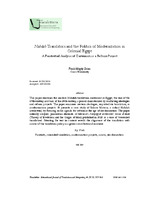Mostrar el registro sencillo del ítem
Nahdah Translators and the Politics of Modernization in Colonial Egypt: A Paratextual Analysis of Darwinism as a Reform Project
| dc.contributor.author | Zeina, Farah Magdy | |
| dc.date.accessioned | 2020-10-20T12:28:56Z | |
| dc.date.available | 2020-10-20T12:28:56Z | |
| dc.date.issued | 2020 | |
| dc.identifier.issn | 2605-2954 | |
| dc.identifier.uri | http://hdl.handle.net/10396/20552 | |
| dc.description.abstract | This paper examines the modern Nahdah translation movement in Egypt, the end of the 19th century and turn of the 20th century, a period characterized by conflicting ideologies and reform projects. The paper examines western ideologies, imported via translation, as modernization projects. It presents a case study of Salama Moussa, a radical Nahdah intellectual, by focusing on his agenda for reform in the age of decolonization. The paper critically analyzes paratextual elements of Moussa’s Nazariyyat al-tatawwur wa-asl al-insan (Theory of Evolution and the Origin of Man) published in 1928 as a case of ‘concealed translation’. Situating the text in context reveals the alignment of the translation with norms of the translation policy in a given socio-historical moment. | es_ES |
| dc.format.mimetype | application/pdf | es_ES |
| dc.language.iso | eng | es_ES |
| dc.publisher | UCOPress | es_ES |
| dc.rights | https://creativecommons.org/licenses/by/3.0/ | es_ES |
| dc.source | Transletters. International Journal of Translation and Interpreting 4, 339-365 (2020) | es_ES |
| dc.subject | Paratexts | es_ES |
| dc.subject | Concealed translation | es_ES |
| dc.subject | Modernization projects | es_ES |
| dc.subject | Norms | es_ES |
| dc.subject | Decolonization | es_ES |
| dc.title | Nahdah Translators and the Politics of Modernization in Colonial Egypt: A Paratextual Analysis of Darwinism as a Reform Project | es_ES |
| dc.type | info:eu-repo/semantics/article | es_ES |
| dc.relation.publisherversion | https://www.uco.es/ucopress/ojs/index.php/tl/index | es_ES |
| dc.rights.accessRights | info:eu-repo/semantics/openAccess | es_ES |

